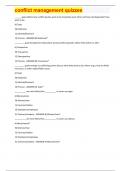Exam (elaborations)
conflict management quizzes
- Course
- Institution
conflict management quizzes conflict management quizzes conflict management quizzes conflict management quizzes conflict management quizzes conflict management quizzes conflict management quizzes conflict management quizzes conflict management quizzes conflict management quizzes conflict ...
[Show more]



